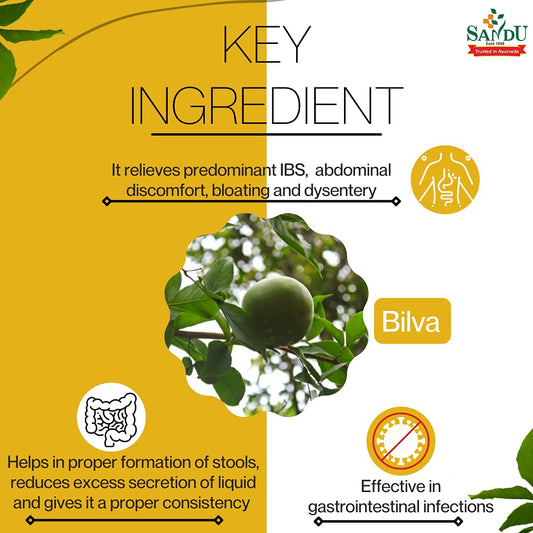Collection: Gastro IBS
In Ayurveda, digestive disorders falling under the category of Gastrointestinal (GI) issues, including Irritable Bowel Syndrome (IBS), are often attributed to imbalances in the body's energies (doshas), particularly disturbances in the Vata, Pitta, and Kapha doshas. Ayurvedic treatment for IBS aims to rebalance these energies, enhance digestive function, and eliminate accumulated toxins. Here are some key aspects of Ayurvedic approaches to managing Gastrointestinal issues and IBS:
 1. Dosha Imbalance: Ayurveda identifies different types of IBS based on dosha dominance. Vata-type IBS is characterized by symptoms like bloating and gas, Pitta-type involves inflammation and diarrhea, and Kapha-type is associated with mucus and constipation. Treatment is tailored based on the specific doshic imbalance.
1. Dosha Imbalance: Ayurveda identifies different types of IBS based on dosha dominance. Vata-type IBS is characterized by symptoms like bloating and gas, Pitta-type involves inflammation and diarrhea, and Kapha-type is associated with mucus and constipation. Treatment is tailored based on the specific doshic imbalance.
2. Digestive Fire (Agni): The concept of Agni, or digestive fire, is crucial in Ayurveda. Restoring and balancing Agni is central to addressing digestive disorders. This may involve dietary modifications, herbs, and lifestyle practices that support healthy digestion.
3. Toxin Elimination (Ama Pachana): Accumulated toxins (Ama) are considered contributors to digestive issues. Ayurvedic treatments aim to eliminate Ama through detoxification processes, dietary adjustments, and the use of specific herbs with detoxifying properties.
4. Lifestyle Guidance: Stress is often a significant factor in IBS, and Ayurvedic treatments include lifestyle recommendations to manage stress. Practices such as yoga, meditation, and pranayama (breath control) are employed to nourish the mind and nervous system.
5. Herbal Remedies: Ayurvedic herbs play a crucial role in managing digestive disorders. Herbs like Triphala, Haritaki, Amla, and others are commonly used to support digestion, reduce inflammation, and promote overall gut health.
6. Dietary Recommendations: Ayurveda emphasizes a personalized approach to diet based on an individual's dosha constitution. Dietary adjustments may include selecting foods that pacify aggravated doshas and avoiding those that aggravate them.
7. Mind-Body Connection: Ayurveda recognizes the strong connection between the mind and the digestive system. Emotional and mental well-being is addressed through practices that promote mental clarity, relaxation, and emotional balance.
It's important to note that Ayurvedic treatments are individualized, and the approach may vary based on a person's unique constitution and the specific type of IBS they are experiencing. Consulting with a qualified Ayurvedic practitioner is advisable for personalized guidance and treatment plans tailored to individual needs. Additionally, individuals with IBS should coordinate any Ayurvedic treatments with their healthcare provider to ensure a comprehensive and safe approach to their health.
-
Mantra Ayurveda – Mantra Amrit Syrup
Regular price Rs. 300.00Regular priceUnit price / perRs. 370.00Sale price Rs. 300.00Sale -
Mantra Ayurveda – Jathragni Mantra Syrup
Regular price Rs. 150.00Regular priceUnit price / perRs. 150.00Sale price Rs. 150.00 -
Sandu Bilagyl | Best Ayurvedic Medicine for Diarrhea due to IBS
Regular price Rs. 180.00Regular priceUnit price / perRs. 200.00Sale price Rs. 180.00Sold out -
Mantra Ayurveda - Yakrit 01 Lft Syrup
Regular price Rs. 150.00Regular priceUnit price / perRs. 150.00Sale price Rs. 150.00








